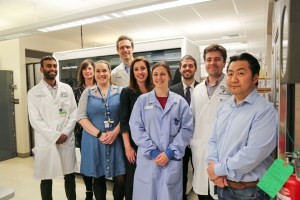
Brigham and Women’s Hospital successfully validated a COVID-19 test for admitted patients, offering results within 24 hours. A team of experts from the Department of Pathology have been racing against the clock in response to the COVID-19 outbreak.
A team of clinicians and researchers in clinical molecular pathology and microbiology refined a technique that allows in-house testing for COVID-19 patients who have been admitted to the Brigham but do not yet have a definitive diagnosis. Confirming or ruling out COVID-19 in hours rather than days will help accelerate the right care for patients in need and the right precautions for all.
“A test with a shorter turnaround time is critical in a hospital setting for patients who are severely ill,” said Manfred Brigl, MD, co-director of the Brigham’s Clinical Microbiology Laboratory.
Collaboration Efforts to Bring Testing In-house
Under Brigl’s leadership, the clinical microbiology lab is collaborating with the Center for Advanced Molecular Diagnostics, directed by Neal Lindeman, MD, to make in-house testing at the Brigham rapid and responsive. Developing the test requires the combined talents of multiple teams, including one with expertise in handling infectious materials and one with expertise in designing molecular clinical laboratory tests.
When testing for viruses such as influenza-A or -B or respiratory syncytial virus, the approach is usually far more straightforward and streamlined than it currently is for COVID-19.
“Methodologies for testing [for COVID-19] are far more complex and require instrumentation and steps that no single lab is currently able to produce on its own,” said Michael Mina, MD, PhD who is an associated medical director in the clinical microbiology lab and helping development of the test. “To bring testing in-house, we’ve collaborated to bring together our expertise.”
The in-house testing requires perfecting two parts: Extracting RNA from a patient’s sample and then determining whether viral genomic segments from SARS-CoV-2 – the virus that causes COVID-19 – are in the sample. The labs at Brigham and Women’s Hospital have re-designed COVID-19 testing to work around the shortage of specific kits for RNA extraction. After recent discussions with senior leadership at Health and Human Services and the Food and Drug Administration, the re-designed protocol was approved for development, reducing regulatory and supply-chain barriers and enabling the team to move ahead with the test.
Accelerating Testing Turnaround Time to Increase Efficiency
“It should take just a few hours to get results and we should be able to run approximately 20 at a time, multiple times a day,” said Lindeman.
Turnaround time may lengthen if there is a dramatic increase in samples to be analyzed. To increase capacity for results that are needed urgently, tests that are not time-sensitive will be run less often or will be sent to outside labs. The Brigham is working closely with Massachusetts General Hospital, which is also developing in-house testing. The two hospitals are supporting each another, sending samples to one another depending on who has capacity.
Lindeman has been struck by the spirit of collaboration and generosity among not only the hospitals but across research labs. Before the workaround test was approved by the FDA, his team asked Research Administration to put out a call for RNA extraction kits. The response was overwhelming.
“We were looking for six kits. We were offered 200 by research labs,” said Lindeman. He described it as “heartwarming” and “collegial” — but is happy to report that they are no longer in demand by the team.
The team’s next goal is to increase the capacity of testing in preparation for the influx of patient volume.
*Image: Members of the team developing the Brigham’s in-house COVID-19 test (not pictured: Neal Lindeman) From left: Sanjat Kanjilal, Autumn Duschesne, Jacqueline Sobchuk, Manfred Brigl, Laura MacConnail, Rebecca Zaffini, Michael Mina, Alexander Pyden, Michael Slevin